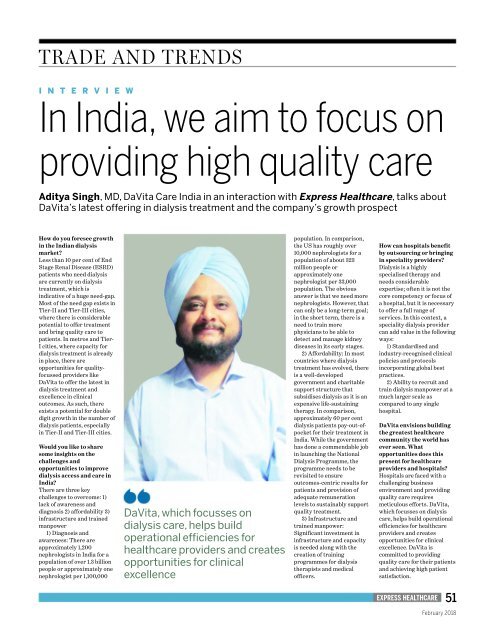Express_Healthcare__February_2018
You also want an ePaper? Increase the reach of your titles
YUMPU automatically turns print PDFs into web optimized ePapers that Google loves.
TRADE AND TRENDS<br />
I N T E R V I E W<br />
In India, we aim to focus on<br />
providing high quality care<br />
Aditya Singh, MD, DaVita Care India in an interaction with <strong>Express</strong> <strong>Healthcare</strong>, talks about<br />
DaVita’s latest offering in dialysis treatment and the company’s growth prospect<br />
How do you foresee growth<br />
in the Indian dialysis<br />
market?<br />
Less than 10 per cent of End<br />
Stage Renal Disease (ESRD)<br />
patients who need dialysis<br />
are currently on dialysis<br />
treatment, which is<br />
indicative of a huge need-gap.<br />
Most of the need gap exists in<br />
Tier-II and Tier-III cities,<br />
where there is considerable<br />
potential to offer treatment<br />
and bring quality care to<br />
patients. In metros and Tier-<br />
I cities, where capacity for<br />
dialysis treatment is already<br />
in place, there are<br />
opportunities for qualityfocussed<br />
providers like<br />
DaVita to offer the latest in<br />
dialysis treatment and<br />
excellence in clinical<br />
outcomes. As such, there<br />
exists a potential for double<br />
digit growth in the number of<br />
dialysis patients, especially<br />
in Tier-II and Tier-III cities.<br />
Would you like to share<br />
some insights on the<br />
challenges and<br />
opportunities to improve<br />
dialysis access and care in<br />
India?<br />
There are three key<br />
challenges to overcome: 1)<br />
lack of awareness and<br />
diagnosis 2) affordability 3)<br />
infrastructure and trained<br />
manpower<br />
1) Diagnosis and<br />
awareness: There are<br />
approximately 1,200<br />
nephrologists in India for a<br />
population of over 1.3 billion<br />
people or approximately one<br />
nephrologist per 1,100,000<br />
DaVita, which focusses on<br />
dialysis care, helps build<br />
operational efficiencies for<br />
healthcare providers and creates<br />
opportunities for clinical<br />
excellence<br />
population. In comparison,<br />
the US has roughly over<br />
10,000 nephrologists for a<br />
population of about 323<br />
million people or<br />
approximately one<br />
nephrologist per 33,000<br />
population. The obvious<br />
answer is that we need more<br />
nephrologists. However, that<br />
can only be a long-term goal;<br />
in the short term, there is a<br />
need to train more<br />
physicians to be able to<br />
detect and manage kidney<br />
diseases in its early stages.<br />
2) Affordability: In most<br />
countries where dialysis<br />
treatment has evolved, there<br />
is a well-developed<br />
government and charitable<br />
support structure that<br />
subsidises dialysis as it is an<br />
expensive life-sustaining<br />
therapy. In comparison,<br />
approximately 60 per cent<br />
dialysis patients pay-out-ofpocket<br />
for their treatment in<br />
India. While the government<br />
has done a commendable job<br />
in launching the National<br />
Dialysis Programme, the<br />
programme needs to be<br />
revisited to ensure<br />
outcomes-centric results for<br />
patients and provision of<br />
adequate remuneration<br />
levels to sustainably support<br />
quality treatment.<br />
3) Infrastructure and<br />
trained manpower:<br />
Significant investment in<br />
infrastructure and capacity<br />
is needed along with the<br />
creation of training<br />
programmes for dialysis<br />
therapists and medical<br />
officers.<br />
How can hospitals benefit<br />
by outsourcing or bringing<br />
in speciality providers?<br />
Dialysis is a highly<br />
specialised therapy and<br />
needs considerable<br />
expertise; often it is not the<br />
core competency or focus of<br />
a hospital, but it is necessary<br />
to offer a full range of<br />
services. In this context, a<br />
speciality dialysis provider<br />
can add value in the following<br />
ways:<br />
1) Standardised and<br />
industry-recognised clinical<br />
policies and protocols<br />
incorporating global best<br />
practices.<br />
2) Ability to recruit and<br />
train dialysis manpower at a<br />
much larger scale as<br />
compared to any single<br />
hospital.<br />
DaVita envisions building<br />
the greatest healthcare<br />
community the world has<br />
ever seen. What<br />
opportunities does this<br />
present for healthcare<br />
providers and hospitals?<br />
Hospitals are faced with a<br />
challenging business<br />
environment and providing<br />
quality care requires<br />
meticulous efforts. DaVita,<br />
which focusses on dialysis<br />
care, helps build operational<br />
efficiencies for healthcare<br />
providers and creates<br />
opportunities for clinical<br />
excellence. DaVita is<br />
committed to providing<br />
quality care for their patients<br />
and achieving high patient<br />
satisfaction.<br />
EXPRESS HEALTHCARE 51<br />
<strong>February</strong> <strong>2018</strong>



